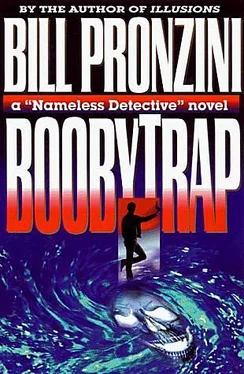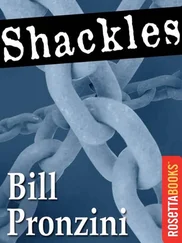I brought him out and caught him with my left hand, held him around the middle. Then I worked the rod into the crook of my right arm and used the fingers of that hand to remove the hook. Some fine fish. I could work this spot and a dozen others the entire week I was here and not snag another of this size. Pure sweet luck to take such a prize in the first five minutes.
The feel of his body was hard and firm, the kind of mountain trout whose flesh flakes like a cracker when it’s cooked. The best eating there is. My mouth began to water just thinking about it. And yet I couldn’t seem to take the next step, which was to un-sheath my knife and kill the fish by bashing its head with the weighted handle. I kept standing there, holding him, feeling him squirm, feeling the life in him, watching his mouth and gills open and close, open and close as he sucked air.
Come on, I thought, get it over with.
Yeah, I thought. Breakfast right here in your hand, meal fit for a king.
Aloud I said, “Fish, we’re both lucky as hell this morning,” and I leaned down and released him. Quick flash of orange and he was gone for good.
I sighed and straightened up. For about five seconds I was mildly disgusted with myself; then a kind of elation began to work in me and all of a sudden I felt fine, really happy. So happy and free and full of life, like that beauty of a trout swimming around somewhere beneath the sunbright surface, that I laughed out loud — a laugh like the bark of an old sea lion. That was me, by God, an old sea lion sunning its fat on a rock—
“Hey, you okay down there?”
The voice came from behind and above me, close enough to make me jump and then twist around. A guy carrying a fly rod in one hand and a polypropylene tackle box in the other was standing on an outcrop about twenty yards away. Had been standing there, anyway, no telling how long; now he stepped off and made his way down over a scatter of loose rock and gravel toward where I was.
I went to meet him on the bank. At first I took him for a stranger, but when we were close enough I recognized him — another of the first-timers, the pale-eyed Mr. Average. Jacob something; I still couldn’t remember his last name.
He said in his medium voice, “What’d you do it for?”
“Do what? Oh, the fish.”
“Looked like a nice cutthroat. You’re not one of those catch-and-release types, are you?”
“No.” At least, I thought, I didn’t used to be.
“So how come you let it go?”
I shrugged. “Momentary whim.”
“Why’d you laugh like that, afterward?”
“No particular reason. Just feeling good.”
“I thought maybe you were having some kind of attack.” He seemed puzzled by what I’d done, as if he couldn’t conceive of anyone behaving that way. It made me a little uncomfortable. A touch embarrassed, too, in spite of myself, as if I’d been caught performing an unnatural act or exhibiting signs of an acute mental disorder.
“One of those mornings when you’re glad you’re alive,” I said. “I figured the trout deserved to enjoy it, too.”
“Why? It’s nothing but a fish.”
“A fish is something. One of God’s creatures.”
“You should’ve killed it,” he said.
“But I didn’t.” Strayhorn, that was it. Jacob Strayhorn. “My business either way, right? I’m the one who caught it.”
He stared at me for a few seconds, then made a movement with his head, a kind of cranial shrug, and said through a small, pale smile, “Sure, that’s right. Your fish, you could do whatever you wanted with it.”
To change the subject I asked, “How about you? Any luck this morning?”
“Not much. Couple of brookies.”
“Well, it’s early yet.”
“You going to keep working this pool?”
“For a while.”
“If you hook that brown again, what’ll you do?”
One-track mind. “Chances are I won’t.”
“But if you do. Let it go again?”
“Why does it matter so much to you, Strayhorn?”
“It doesn’t matter. I’m just curious.”
“I don’t know what I’d do. Does anybody know exactly what he’ll do in every situation?”
“Some people do,” Strayhorn said. “I do.”
“Every situation, every time?”
“That’s right.”
“Circumstances, intangibles — they don’t matter?”
“Not when you’ve got a definite purpose.”
“Like fishing.”
“Fishing, hunting, whatever. You ought to be that way, too, the kind of business you’re in. How can you be a cop and not be sure of yourself, what you’re doing every minute?”
“I didn’t say I didn’t know what I was doing. I said I don’t always react the same way. It’s a mistake to equate purpose and dedication with an inflexible mind-set. A good cop keeps an open mind.”
“The way you did with that fish,” Strayhorn said. “Momentary whim, no real purpose or objective.”
He smiled to take the sting out of the words, but they annoyed me just the same. He annoyed me. In not much more than five minutes Mr. Not So Average had pried open the drain on my high good mood.
I said, “Suppose we drop the subject, okay? Get on with what brought us out here.” I hefted my rod and started to turn away from him.
“Answer one question first,” he said.
“All right, one question.”
“You ever do anything like that with a lawbreaker?”
“Like what?”
“Let him go. Somebody you caught, somebody who committed a crime. A man instead of a fish.”
It threw me for a few beats. There was no way he could know about recent events in my life, but in his irritating fashion he’d managed to cut straight to a still-tender nerve. “No,” I lied. “Never.”
“But you might someday. You’re capable of it. If the circumstances and intangibles are right.”
I didn’t say anything.
“I wouldn’t. No matter what.” He laughed abruptly and then said, “I think I’d make a good cop myself. Maybe a better one than you.”
“The take-no-prisoners kind? The kind that uses fists and nightsticks instead of reason and common sense? I don’t think so, Strayhorn. Whatever you do for a living, I hope like hell it has nothing to do with law enforcement.”
“It doesn’t,” he said, and laughed again. Then, as I swung away from him, “Nice talking to you.”
“Yeah.”
He let me get out onto the rock again before he offered up his parting shot. “I still think you should’ve killed that fish,” he said.
He went off downstream without a backward glance. Leaving me to stand there with a sour taste in my mouth and nothing left of the good-to-be-alive feeling except a memory.
It was ten-thirty when I got to Judson’s. I parked in the lot and walked around to the gas dock with the five-gallon can I’d found in Zaleski’s boathouse and put in the car earlier. Hal Cantrell, the talkative glad-hander, was there ahead of me, pumping unleaded into the Johnson outboard on his rented skiff. He gave me a rueful smile as I came up.
“Man,” he said, “you see the gas prices here?”
“Not yet. Pretty stiff?”
“Three bucks a gallon.”
“Well, it’s a long haul in here from Quincy.”
“Still. Three bucks a gallon.” He shook his head. “Any luck out at Two Creek Bar?”
“Not much,” I said. I hadn’t done much more fishing after the episode with Strayhorn, and what little I’d indulged in had not produced another catch. Just as well. I’d probably feel like going out again tomorrow, but for today I had lost my taste for the sport. “How about you? Find a good spot?”
“Fair. Little inlet on the east shore. Don’t tell anybody, but I’m the lazy kind of fisherman. Rather find a shady spot on the lake, sit in a boat and drink beer for breakfast and contemplate my sins.”
Читать дальше












